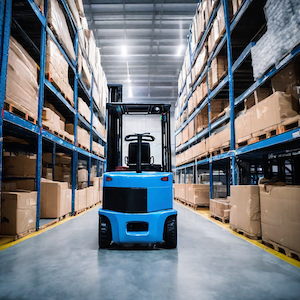
In the bustling world of beverage distribution, operational efficiency reigns supreme. Standard Distributing Co. Inc., a Delaware-based company, has always focused on maintaining a streamlined and efficient warehouse. However, the traditional lead-acid batteries powering their electric lift trucks presented a slew of challenges. They demanded frequent maintenance and a dedicated space for charging, resulting in a less-than-ideal use of warehouse space.
The transition to OneCharge Lithium-ion (Li-ion) forklift batteries in April 2019 was a strategic move that reaped immediate benefits. It not only enhanced the material handling equipment’s efficiency but also aligned perfectly with the company’s green policy—signifying a major leap towards sustainable industrial material handling.
Standard Distributing experienced a significant upgrade in their cold storage logistics, thanks to the lithium batteries’ ability to maintain charge and performance in temperature-controlled cold environment.
The switch also meant that their fleet of 17 trucks could be downsized to 12 without compromising on operational output. This was made possible by the lithium batteries’ higher energy capacity and quick-charging capabilities, dramatically reducing the downtime of all electric forklifts in the warehouse.
The switch to lithium batteries eliminated the need for a separate battery changing room—thus maximizing warehouse space.
Mike Tielleman, the warehouse manager, observed a notable improvement in the cleanliness and safety of the work environment. The Li-ion batteries negated the need for daily watering, charging, or maintenance, contributing to a cleaner and safer warehouse—a critical factor in the food and beverage industry.
The adoption of lithium technology has also contributed to the company’s green initiatives, propelling it towards its sustainability goals. The switch from lead-acid to Li-ion batteries underscores the benefits of clean and maintenance-free industrial batteries, as it has resulted in a cleaner workspace with reduced hazardous waste.
Moreover, the case of Standard Distributing serves as an exemplary model for the food and beverage distribution sector. It showcases how lithium forklift batteries can streamline operations, elevate safety standards, and contribute to a company’s sustainability efforts. For the broader material handling industry, this case study illustrates the potential for improved efficiencies and cost savings, thanks to the advanced technology of lithium-ion batteries.
In conclusion, lithium batteries have proven to be a game-changer for Standard Distributing, providing a robust solution to their operational challenges. The company’s success story is a testament to the impact that this technology can have on the efficiency, safety, and environmental footprint of businesses within the food and beverage distribution industry.
 by Max Khabur | January 12, 2024
by Max Khabur | January 12, 2024